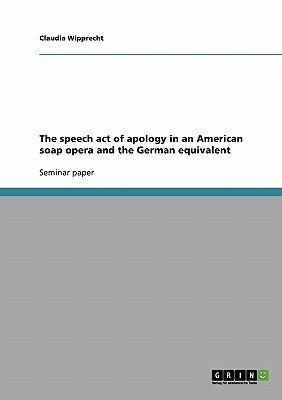
- We will send in 10–14 business days.
- Author: Claudia Wipprecht
- Publisher: GRIN Verlag
- Year: 2007
- Pages: 80
- ISBN-10: 3638814033
- ISBN-13: 9783638814034
- Format: 14.8 x 21 x 0.5 cm, minkšti viršeliai
- Language: English
- SAVE -10% with code: EXTRA
The speech act of apology in an American soap opera and the German equivalent (e-book) (used book) | bookbook.eu
Reviews
Description
Seminar paper from the year 2006 in the subject English Language and Literature Studies - Linguistics, grade: 1,0, University of Erfurt (Philosophische Fakultät), course: Sprachstruktur und Sprachgebrauch II, language: English, abstract: Across all languages there are more or less conventionalized linguistic means to be found, e.g. to form a question, make a request, express gratitude or utter an apology. The crucial question is how these conventions look, what kind of language behavior is adequate in a certain situation and if it is understood in the context; these conventions differ interculturally. The speech act theory, whose pioneer is clearly John Austin (1955 "How to do things with words"), is an adequate approach to gain a deep insight in speech acts like greeting, promising or apologizing. This paper deals with the speech act set of apology. Apologies are clearly performative and expressive. They establish and maintain social contacts. All speakers of a language know certain patterns of speech act sequences, i.e. they know what has to follow after an apology and what is inappropriate. The ability to apply these patterns constitutes a part of communicative competence. In my paper I will focus on apologies made in an American soap opera, trying to find out the structure of this speech act also considering factors like social relationships and afterwards compare it to the dubbed German version. The aim of this paper is to draw a conclusion on whether cultural factors play a significant role for the translated edition and if the genuine is a prime example for this culture.
EXTRA 10 % discount with code: EXTRA
The promotion ends in 23d.02:25:23
The discount code is valid when purchasing from 10 €. Discounts do not stack.
- Author: Claudia Wipprecht
- Publisher: GRIN Verlag
- Year: 2007
- Pages: 80
- ISBN-10: 3638814033
- ISBN-13: 9783638814034
- Format: 14.8 x 21 x 0.5 cm, minkšti viršeliai
- Language: English English
Seminar paper from the year 2006 in the subject English Language and Literature Studies - Linguistics, grade: 1,0, University of Erfurt (Philosophische Fakultät), course: Sprachstruktur und Sprachgebrauch II, language: English, abstract: Across all languages there are more or less conventionalized linguistic means to be found, e.g. to form a question, make a request, express gratitude or utter an apology. The crucial question is how these conventions look, what kind of language behavior is adequate in a certain situation and if it is understood in the context; these conventions differ interculturally. The speech act theory, whose pioneer is clearly John Austin (1955 "How to do things with words"), is an adequate approach to gain a deep insight in speech acts like greeting, promising or apologizing. This paper deals with the speech act set of apology. Apologies are clearly performative and expressive. They establish and maintain social contacts. All speakers of a language know certain patterns of speech act sequences, i.e. they know what has to follow after an apology and what is inappropriate. The ability to apply these patterns constitutes a part of communicative competence. In my paper I will focus on apologies made in an American soap opera, trying to find out the structure of this speech act also considering factors like social relationships and afterwards compare it to the dubbed German version. The aim of this paper is to draw a conclusion on whether cultural factors play a significant role for the translated edition and if the genuine is a prime example for this culture.


Reviews